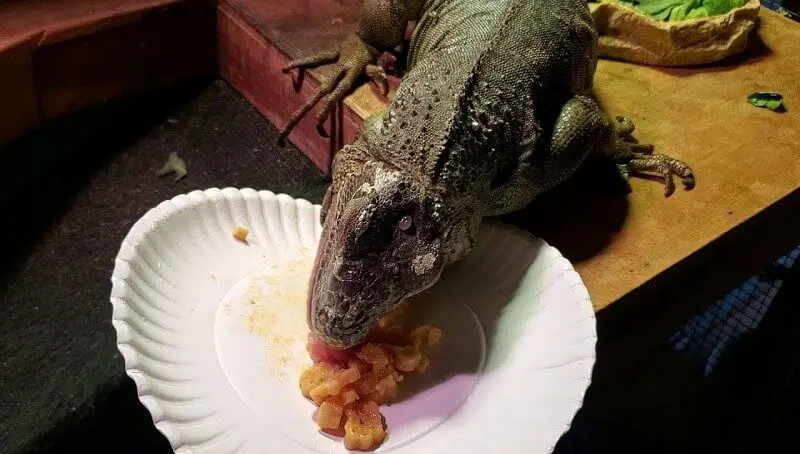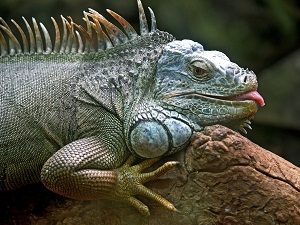
The Great Dane-Boxer Mix (Boxane) Breed Information
May 26, 2022
Full-grown Puggles – General Information
May 28, 2022
The health and longevity of your iguana depend heavily on its diet. This must be respected rigorously to avoid health issues that are sometimes fatal to your reptile. Its digestive system tolerates only certain types of food.
The iguana is a vegetarian reptile. Therefore, it must eat only plant-based food which means that iguanas must not eat cheese or dairy products. Its proteins should not be of animal origin, as this would interfere with the well-functioning of its digestive tract and could lead to its loos. Above all, the iguana doesn’t need them in order to live or have good health.
Like lizards, the calcium requirement must be double that of the phosphorus. Thus, it is important to distill calcium-rich foods to prevent the pet from getting osteofibrosis, namely fragile bones that are easier to break.
Why is cheese bad for iguanas?
Its stomach is very delicate and does not process much of the food that people eat, therefore you need to carefully monitor what you offer to your iguana. And although it has teeth, the iguana hardly uses them and when it does, it will only make use of them to grab the food, not to chop it up. Therefore, we are the ones who have to help it by chopping the food into very small pieces.
As I said above, iguanas must have a strictly plant-based diet because any other types of foods can cause it to suffer various digestive problems. In this case, cheese has nothing to do with the nutrients an iguana needs to be healthy, and its body isn’t designed to digest anything that isn’t vegetal like dairy products.â
You might also like my articles on whether iguanas can eat bananas or cilantro and whether bearded dragons can eat banana peppers.
Feeding the iguana cheese can lead to serious gastric problems because it contains a lot of salt and is rich in fat. There are some iguana owners that say you can feed them cheese as long as it is lactose-free and low-fat, but that is not true.
To be clear, even if you feed it this type of cheese, with less saturated fat and lactose-free, it won’t make much of a difference as they are not able to digest this type of food. The safest way to feed your iguana is to stick to its diet formed of fruit, vegetables, flowers, grass, and leaves.
You can find all sorts of interesting receipts for your iguana, depending on its age, nutrients it needs, or preferences. Keep in mind that you can help it have a healthy and long life in captivity by offering it a well-balanced diet.
Can I mix cheese with vegetables for iguanas?
Some say you can mix cheese with vegetables high in vitamin K or rich in water, but you should not make it a frequent meal or snack, as this pet cannot digest dairy products.
Can I give my iguana cheese sometimes as a treat?
If you feel the need to offer your iguana cheese, you should know that a bite as a treat or snack won’t be fatal to it. Just make sure you won’t make it a normal occurrence.
Can eating cheese become lethal for an iguana?
A bite of cheese, from time to time, won’t kill the iguana, but it may have some side effects in the long term. The lack of minerals and nutrients, like Calcium and vitamin D, can lead to metabolic bone disease if they don’t have a proper diet.
For a healthy life, iguanas need a well-balanced diet based on plants. Cheese is not necessary for them because it doesn’t have the nutrients or benefits an iguana needs.
What foods are safe for iguanas to eat?
Plants
 The iguana’s diet is based on more than 2-thirds of plants. They can eat many and varied types of plants. They will really like to eat plants that are hardwood and, in principle, here are some of the best: Batavia, celery leaves, oak, white nettle, watercress, dandelion, rucola, parsley, endive, spinach, and various countertops.
The iguana’s diet is based on more than 2-thirds of plants. They can eat many and varied types of plants. They will really like to eat plants that are hardwood and, in principle, here are some of the best: Batavia, celery leaves, oak, white nettle, watercress, dandelion, rucola, parsley, endive, spinach, and various countertops.
It can also ingest hybrid plants like Billbergia, or also plain salad. Cellulose is very important for this animal.
Vegetables
Cellulose can also be found in vegetables. Many are suitable for the digestive system of the iguana, such as beets, and Brussels sprouts, but also turnips, asparagus, cucumbers, parsnips, and don’t forget the peppers.
The fruits
Calcium intake should also be completed with fruit. It should prove useful in feeding the iguana. Thus, it will appreciate apricots, pineapple, cherries, figs, lychees, mangoes, melon, blackberries, grapes, nectarines, oranges, apples, pears, peaches, strawberries, raspberries or even kiwi and watermelon.
When feeding the iguana, you must take into account the size of the iguana’s head and ensure that food is easy to swallow. Baby iguanas should be fed daily. It is recommended to change the feeder twice a day, changing the combination of vegetables as often as possible. You should encourage your iguana to eat, as only a few get to live more than a year in captivity.
Your iguana is a vegetarian animal that should only eat vegetable protein, which has high calcium requirements, slightly less phosphorus, and which should never be dehydrated. Thus, its diet consists of trees with leaves, vegetables, and fruits. Croquettes should be avoided because they are too dry. Just like meat, cheese and dairy products should be avoided because they are not digested by the iguana.
